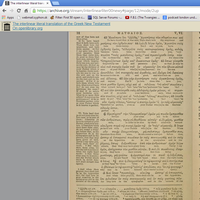7. Ovid 1-20, FINAL
|final
7. Ovid 1-20, FINAL
7. Ovídio 1-20, FINAL
1 quaerenda est oculis apta puella tuis.
to be sought||eyes|suitable||your
1 The girl suitable for your eyes must be sought.
2 scit bene venator, cervis ubi retia tendat;
knows|well|hunter|deer|where|nets|he stretches
2 The hunter knows well where to set his nets for deer;
3 scit bene, qua frendens valle moretur aper.
knows|||grumbling|valley|lingers|wild boar
3 He knows well where the snarling boar lingers in the valley.
4 aucupibus noti frutices; qui sustinet hamos,
for the birdcatchers|known|bushes||holds|hooks
The bushes known to bird-catchers; who supports the hooks,
5 novit quae multo pisce natentur aquae.
he knows|which|by much|fish|swim|waters
Knows what fish swim in the deep waters.
6 tu quoque, materiam longo qui quaeris amori,
|also|matter|long|who|you seek|for love
You also, who seek material for long love affairs,
7 ante frequens quo sit disce puella loco.
before|frequent|where|be|learn||place
7 Learn in advance in what place the girl often is.
8 non ego quaerentem vento dare vela iubebo,
not|I|seeking|wind|to give|sails|I will command
8 I will not command you to set sail seeking the wind,
9 nec tibi, ut invenias, longa terenda via est.
nor|to you|to|you may find|long|to be spent|way|
9 nor is a long road to be worn out by you in order to find her.
10 Andromedan Perseus nigris portarit ab Indis,
Andromedan|Perseus|black|he carried|by|the Indians
10 Perseus of Andromeda will bring black women from India,
11 raptaque sit Phrygio Graia puella viro;
and having been seized|be|Phrygian|Greek||man
11 and the Greek girl will be snatched by the Phrygian man;
12 tot tibi tamque dabit formosas Roma puellas,
so many|to you|and|will give|beautiful||
12 Rome will give you so many beautiful girls,
13 'haec habet' ut dicas 'quicquid in orbe fuit.'
this|has|that|you say|whatever||the world|was
13 'This has,' so you might say, 'whatever has existed in the world.'
14 Gargara quot segetes, quot habet Methymna racemos,
||crops|how many|has|Methymna|clusters
14 As many grain fields as Gargara has, as many vine bunches as Methymna has,
15 aequore quot pisces, fronde teguntur aves,
sea|how many||by leaves|are covered|birds
15 as many fishes swim in the sea, as many birds are covered in foliage,
16 quot caelum stellas, tot habet tua Roma puellas:
as many|sky|stars|so many||||
17 mater in Aeneae constitit urbe sui.
mother||Aeneas|she stopped|city|her
17 the mother stood in the city of Aeneas of her own.
18 seu caperis primis et adhuc crescentibus annis,
or|you are captured|first||still|growing|years
18 whether you capture in the first and still growing years,
19 ante oculos veniet vera puella tuos:
||will come|a true||
19 before your eyes will come a true maiden:
20 sive cupis iuvenem, iuvenes tibi mille placebunt.
whether|you desire|young man|youths|to you|a thousand|will please
If you desire a young man, a thousand young men will please you.

